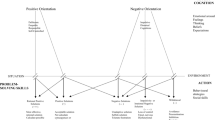Abstract
A prospective design was used to examine the relations between problem-solving scores derived from the Social Problem-Solving Inventory (SPSI) and later academic performance in college students, while controlling for the level of academic aptitude. The SPSI is a new, multidimensional, self-report measure of social problem-solving ability that provides for a separate assessment of a person's “problem orientation” (i.e., generalized cognitive—emotional—behavioral response set) and his or her “problem-solving skills” (i.e., problem definition and formulation, generation of alternative solutions, decision making, solution implementation and verification). The results showed that the skills measure, but not the orientation measure, significantly predicted cumulative grade point average at the end of the academic year, even after controlling for academic aptitude. The results were interpreted as contributing to the validity of the SPSI and are discussed in relation to other predictors of academic competence.
Similar content being viewed by others
References
Brown, W. F., & Holtzman, W. H. (1967).SSHA manual: survey of study habits and attitudes. New York: The Psychological Corporation.
D'Zurilla, T. J. (1986).Problem-solving therapy: A social competence approach to clinical intervention. New York: Springer.
D'Zurilla, T. J. (1990). Problem-solving training for effective stress management and prevention.Journal of Cognitive Psychotherapy: An International Quarterly, 4 327–354.
D'Zurilla, T. J., & Goldfried, M. R. (1971). Problem-solving and behavior modification.Journal of Abnormal Psychology, 78 107–126.
D'Zurilla, T. J., & Maydeu-Olivares (1992).Assessment of social problem-solving abilities and performance in adults. Manuscript submitted for publication.
D'Zurilla, T. J., & Nezu, A. (1982). Social problem solving in adults. In P. C. Kendall (Ed.),Advances in cognitive-behavioral research and therapy (Vol. 1, pp. 201–274). New York: Academic Press.
D'Zurilla, T. J., & Nezu, A. M. (1990). Development and preliminary evaluation of the Social Problem-Solving Inventory.Psychological Assessment: A Journal of Consulting and Clinical Psychology, 2 156–163.
D'Zurilla, T. J., & Sheedy, C. F. (1991). The relation between social problem-solving ability and subsequent level of psychological stress in college students.Journal of Personality and Social Psychology, 61 841–846.
Edwards, J. E., & Waters, L. K. (1981). Moderating effects of achievement motivation and locus of control on the relationship between academic ability and academic performance.Educational and Psychological Measurement, 41 585–587.
Elliott, T. R., Godshall, F., Shrout, J. R., & Witty, T. E. (1990). Problem-solving appraisal, self-reported study habits, and performance of academically at-risk college students.Journal of Counseling Psychology, 37 203–207.
Goldfried, M. R., & D'Zurilla, T. J. (1973). Prediction of academic competence by means of the survey of study habits and attitudes.Journal of Educational Psychology, 64 116–122.
Gordon, R. A. (1989). Intention and expectation measures as predictors of academic performance.Journal of Applied Social Psychology, 19 405–415.
Heppner, P. P., & Anderson, W. P. (1985). The relationship between problem solving self-appraisal and psychological maladjustment.Cognitive Therapy and Research, 9 415–427.
Heppner, P. P., & Petersen, C. H. (1982). The development and implications of a personal problem-solving inventory.Journal of Counseling Psychology, 29 66–75.
Houston, L. N. (1987). The predictive validity of a study habits inventory for first semester undergraduates.Educational and Psychological Measurement, 47 1025–1030.
Kanoy, K. W., Wester, J. L., & Latta, M. (1989). Predicting college success of freshmen using traditional, cognitive, and psychological measures.Journal of Research and Development in Education, 22 65–70.
Lent, R. W., Brown, S. D., & Larkin, K. C. (1986). Self-efficacy in the prediction of academic performance and perceived career options.Journal of Counseling Psychology, 33 265–269.
Mathiasen, R. E. (1984). Predicting college academic achievement: A research review.College Student Journal, 18 380–386.
Nezu, A. M., & D'Zurilla, T. J. (1989). Social problem solving and negative affective conditions. In P. C. Kendall & D. Watson (Eds.),Anxiety and depression: Distinctive and overlapping features (pp. 285–315). New York: Academic Press.
Nezu, A. M., Nezu, C. M., & Perri, M. G. (1989).Problem-solving therapy for depression: Theory, research, and clinical guidelines. New York: Wiley.
Rajamohan, G. (1978). A study of the relationship between locus of control and academic achievement among college students.Asian Journal of Psychology and Education, 3 52–55.
Tisdelle, D. A., & St. Lawrence, J. S. (1986). Interpersonal problem-solving competency: Review and critique of the literature.Clinical Psychology Review, 6 337–356.
Author information
Authors and Affiliations
Additional information
The authors would like to thank Gale Maschka for her help in the statistical analysis of the data.
Rights and permissions
About this article
Cite this article
D'Zurilla, T.J., Sheedy, C.F. The relation between social problem-solving ability and subsequent level of academic competence in college students. Cogn Ther Res 16, 589–599 (1992). https://doi.org/10.1007/BF01175144
Issue Date:
DOI: https://doi.org/10.1007/BF01175144




